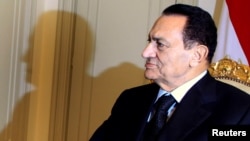ຜູ້ນຳ ເປັນເວລາດົນນານຂອງອີຈິບ ທ່ານຮົສນີ ມູບາຣັກ ໄດ້ເຖິງແກ່ມໍຣະນະກຳແລ້ວ ຮວມອາຍຸໄດ້ 91 ປີ.
ການເຖິງແກ່ມໍຣະນະກຳຂອງທ່ານ ໂທລະພາບແຫ່ງຊາດໄດ້ລາຍງານໃຫ້ຊາບໃນວັນອັງຄານມື້ນີ້.
ທ່ານມູບາຣັກໄດ້ປົກຄອງປະເທດອີຈິບມາເປັນເວລາເກືອບ 30 ປີ ຊຶ່ງທ່ານໄດ້ຖືກໂຄ່ນລົ້ມລົງຈາກອຳນາດໃນປີ 2011 ຫຼັງຈາການປະທ້ວງຂອງປະຊາຊົນເປັນເວລາ 18 ມື້.
ທ່ານໄດ້ຮັບການເລື່ອນຊັ້ນຢູ່ໃນຖັນແຖວຂອງກອງທັບອາກາດອີຈິບ ແລະໃນທີ່ສຸດກໍໄດ້ກາຍເປັນຜູ້ບັງຄັບບັນຊາ ແລະຮອງລັດຖະມົນຕີກະຊວງປ້ອງກັນປະເທດ.
ທ່ານມູບາຣັກ ໄດ້ຖືກແຕ່ງຕັ້ງໃຫ້ເປັນຮອງປະທານາທິບໍດີອານວາ ຊາດັດ ໃນປີ 1975 ແລະຢືນຢູ່ຄຽງຂ້າງທ່ານ ເວລາທ່ານຊາດັດຖືກລອບສັງຫານໃນປີ 1981 ໂດຍພວກຫົວຮຸນແຮງ ອິສລາມ.
ຫລັງຈາກນັ້ນທ່ານກໍໄດ້ເຂົ້າກຳຕຳແໜ່ງປະທານາທິບໍດີແລະກຳຕຳແໜ່ງດັ່ງກ່າວ
ໃນຖານະທີ່ເປັນພັນທະມິດທີ່ໄວ້ເນື້ອເຊື່ອໃຈຂອງປະເທດຕາເວັນຕົກ ທີ່ໃຫ້ກຽດ
ແກ່ສົນທິສັນຍາສັນຕິພາບ ໃນປີ 1979 ກັບອິສຣາແອລ ທັງໆທີ່ໄດ້ມີການຄັດ
ຄ້ານຢ່າງແຂງຂັນຢູ່ໃນສ່ວນໃຫຍ່ຂອງພາກຕາເວັນອອກກາງ.
ພາຍໃນປະເທດ ທ່ານມູບາຣັກໄດ້ປົກຄອງແບບເດັດຂາດ ໂດຍປະກາດໃຊ້ພາວະສຸກເສີນ ຊຶ່ງອຳນວຍໃຫ້ກຳລັງຮັກສາຄວາມສະຫງົບ ມີອຳນາດໃນການປາບ
ປາມພວກຕໍ່ຕ້ານລັດຖະບານແລະຕັດຮອນສິດເສລີພາບຂັ້ນພື້ນຖານຕ່າງໆ.
ອ່ານຂ່າວນີ້ເພີ້ມເປັນພາສາອັງກິດ
Longtime Egyptian leader Hosni Mubarak has died at the age of 91.
His death was reported Tuesday by state television.
Mubarak ruled Egypt for almost 30 years before being swept from power in 2011 after 18 days of popular protests.
He rose through the ranks of the Egyptian air force, eventually becoming commander and deputy defense minister.
Mubarak was named President Anwar Sadat's deputy in 1975 and was at his side when Sadat was assassinated in October 1981 by Islamist militants.
The autocratic leader then assumed the presidency and retained power by positioning himself as a trusted Western ally who honored the 1979 peace treaty with Israel despite fierce opposition throughout most of the Middle East.
At home, Mubarak ruled with an iron fist, imposing Egypt's infamous emergency law, which gave security forces sweeping powers to crack down on dissent and curb basic freedoms.
Mubarak cracked down when Islamist extremists launched a violent campaign in the 1990s that killed hundreds of Egyptian policemen, soldiers and civilians, as well as dozens of foreign tourists.
The authoritarian president had long fought to suppress the Muslim Brotherhood, the Arab world's largest transnational Islamist movement, which originated in Egypt. In doing so, he also marginalized moderate Islamists, alienating their supporters. Many accused him of corruption.
For three decades, Mubarak presided over an uneasy period of enforced stability and economic development.
In January 2011, mass protests against his government erupted in Cairo and other Egyptian cities. On February 1, the aging leader announced he would not seek re-election in a vote scheduled for September. He also promised constitutional reform, but Egyptians demanded more radical change in the wake of the Arab Spring movement beginning to sweep the region.
On February 11, 2011, Vice President Omar Suleiman announced Mubarak was stepping down and that the military's supreme council would run the country. The defiant leader and his family fled to their Red Sea resort home.
Mubarak was later arrested and tried over the deaths of anti-government protesters. On June 2, 2012, he was found guilty of complicity for failing to prevent the killing of hundreds who had revolted against him.
He was sentenced to life in prison along with his former interior minister, Habib Al-Adly, but Egypt's top court later cleared them.
In 2015, Mubarak and his two sons were sentenced to three years on corruption charges, and after being in custody for six years was freed in 2017.










